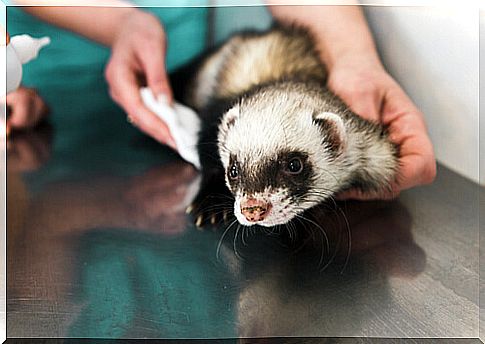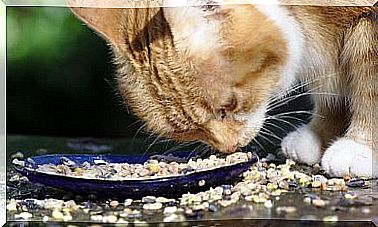Basic Care Of The Domestic Ferret

The first visit of a domestic ferret ( Mustela putorius furo) to the veterinarian is usually in search of advice on its management, diet and disease prevention, that is, on its basic care.
Next, we show you a small file on the animal and later we will delve into the needs and requirements of this friendly domestic mammal.
General characteristics
- Life expectancy : 5 to 8 years.
- Sexual maturity : from 4 to 8 months.
- Gestation : around 42 days.
- Weaning : at 6 – 8 weeks of age.
Basic care of the domestic ferret
First consultation
The owner must be informed about the most common diseases of this species (mainly adrenal gland disease), their prevention and treatment. Knowledge is the first containment barrier against clinical pictures, as it allows the tutor to quickly identify possible pathologies.
First exploration
The procedure is the same as in any other domestic mammal. The only difference is the way of holding them, grasping them by the shoulder girdle or by the crease of the cross.

During the scan, the ears, mouth, teeth, and pharynx will be checked for mites. The abdomen, primarily the kidneys and adrenal glands, spleen, stomach, and intestine will also be palpated for any undesirable enlargement or mass.
Cardiac auscultation will be directed to the search for arrhythmias or murmurs, since ferrets tend to suffer cardiovascular diseases due to their busy activity and rapid metabolism.
Supplementary tests
Depending on what is observed in the first examination, the veterinarian can carry out some complementary tests or others:
- For example, in case of finding excess wax or crusts in the ears, samples will be collected to examine under a microscope whether or not there are mites.
- If the animal has lost weight, shows signs of fever, or any other serious disorder, blood tests are recommended.
On the other hand, in animals four years of age or older, abdominal ultrasounds are common to assess the status of the adrenal glands, pancreas, or mesenteric lymph nodes.
In case of suspecting the ingestion of a foreign body, an abdominal mass or a heart problem, the use of X-rays is recommended. During this procedure it may be necessary to sedate the animal to avoid stressing it.
Normal behavior of a domestic ferret
Ferrets are very active animals at certain times of the day, but the rest of the time is spent resting. In fact, it is not advisable to alter your usual routine to avoid episodes of stress. You have to preserve their hours of sleep, which are usually deep, and keep them entertained at their busiest times.
They are also very clean animals and need a reserved area in their cage for grooming. For this reason, it is recommended that the installation has sufficient dimensions.
One of the most common behavior problems is biting mania. It is convenient to educate it early so that the ferret gets used to not biting and to respect its guardian.

Most common diseases of the domestic ferret
Adult ferrets are prone to two endocrine diseases:
- Adrenal gland disease.
- Insulinomas.
Lymphomas are also diagnosed relatively frequently, hence routine blood tests are recommended.
Preventive medicine
Preventive vaccination is usually done against the distemper virus, and in some places, against rabies. It is also recommended not to walk ferrets in areas where there are other animals of their species, or dogs, to avoid contagion with pathogens for which there is no vaccine.
Some of the diseases that adult ferrets suffer are related to an inadequate diet, therefore , preventive medicine involves recommending a correct diet.
Ferrets are strict carnivores, and the feed that we provide them must contain at least 40% protein (all of it of animal origin) and 20% fat. There are also nutritional supplements based on essential oils that help maintain the good condition of the coat.
Finally, the sterilization of females is recommended to avoid diseases related to permanent jealousy; and of the males, to avoid the excess of smell in the adult age.
A perfect pet that carries responsibility
As we have seen, having a ferret in the home involves a series of periodic veterinary visits and certain care to take into account.
These animals are friendly, curious, and sociable, but due to their fast metabolism it is essential to pay attention to possible diseases and pathologies.









